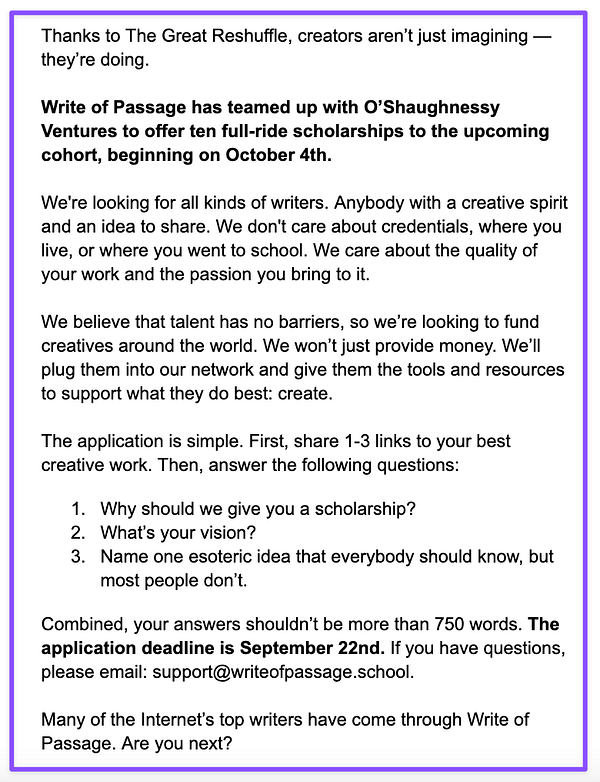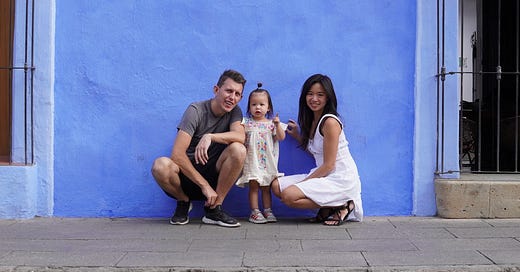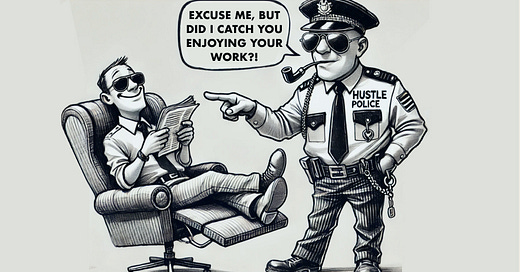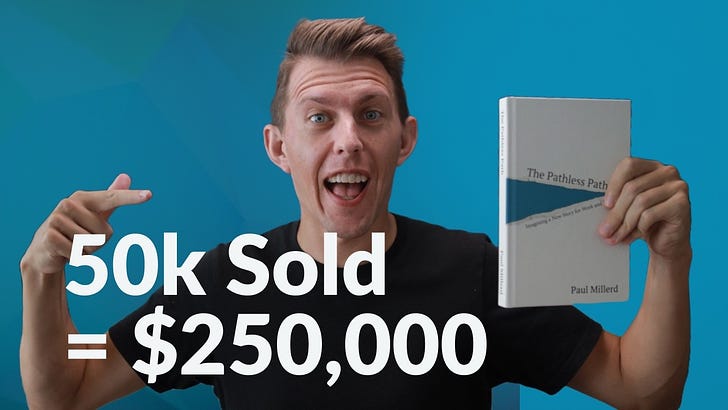The Effective Altruism Impact Trap, Emigrating to the US: A "Write" of Passage, Mimetic Traps | #196
September 10th, 2022: Greetings from Lisbon! I’m getting in great shape wandering the steep roads of the city, averaging about 30-35 flights a day. This week we went and explored a bit and I was blown away by Jeronimo’s Monastery right outside the city. Seen below in a couple pictures that don’t really do it justice is a building that took about 100 years to build, starting in 1501. As an American who is used to seeing things built in 1980 being described as old, I am always blown away by the visible history of the past in Europe.
+ I published a short essay on pricing my time too cheaply while employed on the blog
+ New podcast with Claire Emerson on self-management, digital mentors & procrastination. Have some awesome episodes coming with Gary Ware, Corey Wilks, Anne-Laure Le Cunff & Justin Moore. Subscribe to be updated!
If you are stumbling on this from the internet and boost my internet points, please subscribe here:
You ditched the traditional path… why haven’t you ditched your traditional health insurance?
Experience the freedom and affordability of cash payments and community-funded healthcare with CrowdHealth.
Use promo code “Boundless” during sign-up for a special discounted subscription offer.
#1 The Effective Altruism Trap
The “Effective Altruism” movement is having a moment. I first encountered it many years ago on a site 80,000 hours that advised young people to make as much money as possible so that they could give it away.
I never paid much attention to it except stumbling upon the blog every now and then but over the past decade this movement has not only gained a lot of followers, it has grown into a sort of scene. Some of the followers like Sam Bankman-Fried have even done quite well at the “make money” thing, as he has become a deca-billionaire and is now in the process of giving away a lot of that money to favored “EA” causes via Future Fund.
Which is background for an incredible essay I read this week by Tyler Alterman. Tyler wrote about his journey getting sucked into this movement and building his life around it. Everything seemed to be fine at first but eventually, the goal of having as much impact as possible seemed to consume him. He ended up losing much of his motivation to do anything and had an existential crisis.
His story was interesting because it felt like a more extreme version of what I went through with my relationship with work and also highlights a lot of the traps of aligning your life around the promises of meaning, impact, and success that come with so many paths these days.
The thing that initially pulled Tyler in was the idea that for a small amount of money, one could save a life. One way of assessing the “impact” one can have is through a metric like “QALY” or quality-adjusted life-year. For most people, this type of information can be useful in helping them be more thoughtful about how to give money. But for Tyler, it seemed to be definitive proof that he should re-align his life completely around maximizing his impact:
When I took the EA logic of opportunity costs seriously, my moral obligation became rather extreme: Sure, my basic survival needed to be covered. But any resources I had beyond that, I was Obligated to spend on The Most Impactful Thing, because – if I failed to do so – people would suffer and die. That would make me Bad.
Tyler admits this was a philosophical error:
I now believe the root of my suffering was in a philosophical mistake: I’d supposed there existed some external source of moral authority – in particular, one which imposed a totalizing obligation to help.
It seems that Effective Altruism has attracted people who want to have an “impact” in the world. Even in the world of strategy consulting this sentiment was pervasive. People were always drawn by roles with labels like “sustainability” or “social impact.” Except many of these roles never really deliver what people are after and instead resort to the kind of impact on a spreadsheet that never quite fulfills.
By aiming at ambiguous definitions of “impact” (or at very analytical definitions in the case of “EA”) you turn yourself into an instrument. You are no longer thinking about what you are actually working on and if you are good at it, let alone like it one bit, you are merely focused on the outcomes. Replace impact for “success” and a lot more of you can probably relate.
Do this long enough and you start to disconnect from what you are really good at, what you are drawn to, and what you like at all. I think this is one of the biggest traps in today’s working world. Since so many paths are so uncertain and undefined we seek certainty in the stories we tell ourselves about what we do. We want proof of our specialness and goodness, so any sort of extrinsic measurement that offers proof can convince us to re-orient our entire lives, sometimes for years.
“Impact” was exactly what Tyler was after but this short-circuited his own understanding of what he really wanted. This passage really stood out:
When I went looking for the force or deity outside of myself that held the whip, there was nothing there. I was the one holding the whip. This was a revelation. The thing underlying my moral “obligation” came from me, my own mind. This underlying thing was actually a type of desire. It turned out that I wanted to help suffering people. I wanted to be in service of a beautiful world. Hm.
Suddenly the words of my moral vocabulary took on new meanings. Was I obligated to save the drowning child? Did I have a responsibility or moral duty? Was it something that one should or ought do? This language seemed misleading. These words seemed to replace my natural impulse to help with an artificial demand imposed by…nothing and no one.
It made me angry. I felt like I’d drunk the kool-aid of some pervasive cult, one that had twisted a beautiful human desire into an internal coercion, like one for a child you’re trying to get to do chores while you’re away from home.
In my desire to “be successful,” I did a similar thing and I think I was similarly angry when I finally left my path. How did I spend so long on a path just drifting along without taking a step back to reflect in a meaningful way? Many people are now having similar awakenings, realizing that the promises of success, meaning, and impact that drew them to initially follow a path don’t quite ever deliver, let alone nourish their souls. Yet because we subsumed our identities into those paths, it is a terrifying prospect to blow things up and find a new way forward.
This is why I commend Tyler for writing this essay. So many people struggle to identify why they feel so uncomfortable when it comes to their relationship to work. Tyler shares his own reflections and realizations with brutal honesty and hopefully can be useful for other people in helping them think about their paths.
+ I highly recommend reading the essay in full, it is very good. If you want to learn more about the EA movement in general, I recommend this New Yorker piece or Dwarkesh Patel’s interview with Sam Bankman-Fried.
#2 Moving To The US
Last week, Angie published an essay on her journey moving to the US with me over the last year. It’s an essay she wrote after her experience taking Write of Passage, a course created by Dave Perell.
While I had been aware of the course and loved that Dave seems to be creating more internet friends for me, I had never taken it. Watching Angie take the course, I was blown away. From the quality of the live experiences to the thought put into all the sessions, it’s clear that Dave and his team are pushing the limits on what online education might look like in the future.
And for Angie, it was transformative. Although she had seen how I was working up close and had a couple of years of experience creating and succeeding in Chinese, she has had a very hard time finding her footing creating and working in English. Write of Passage seemed to help her finally find her confidence and find her people. I told her it seemed like the course was a five-week simulation of the best parts of US entrepreneurial culture. Although she had intellectually understood how US work culture operated by watching me and observing others, she could never find an employer to give her a chance or pitch herself in the right ways to land even short-term gigs.
And this has been eye-opening for me too. It’s really hard to watch your partner struggle, especially when you know how smart and capable they are. We know our own cultures so well that we never really think about how hard it might be for outsiders to feel like they are part of the culture. Americans are great at accepting and including people, and my family has been wonderful to Angie. But truly feeling part of something in the ways that you are used to in your home country, that's a journey that takes much longer than people think and you can only accelerate it so much.
But this is my own spin on things. Angie did a much better job of describing her own journey in an essay titled “From fear to thriving.” While she’s still trying to find her footing, I sense she’s definitely on her way to something really great, and of course, I’m rooting for her.
Here’s how the essay starts:
“Your English is good enough! You just have all these stories in your head to stop you from creating again!”
“You don’t understand! You are a native English speaker born and raised here in the States. You can’t possibly know what it is like for me to be an immigrant in this country!” I yelled back.
It was not the first time I had the same argument with my husband, Paul. I sat on the floor, looking out the window, feeling powerless. The Texas sun shone unbearably bright even on that winter day, but it was one of the darkest days of my life.
February 2022. I was three months into living in the States as a first-generation immigrant after leaving my home, Taiwan. Before I left Taiwan, I was getting traction with a podcast, an online course, and writing for publications– all in Mandarin. I wrote with radical honesty and showed up in the world as someone I was excited to be – bold, playful, and proudly weird.
I was thriving.
But when I boarded the flight for the United States after I received my marriage green card, I told myself that these creative endeavors needed to be left behind. Unless I could perfect the English language, I would forever be an outsider.
As you can tell I’m a bit fan of what Dave’s building so was delighted to see Jim O’Shaughnessy sponsoring several scholarships for the course. If you want to join hyper-curious weirdos like Angie, Dave, Jim, and me online in sharing ideas, you’d probably get a kick out of this course (no affiliation!)


#3 Mimetic Traps
Similar to Tyler, Brian Timar shares his reflections on how he drifted deep into a path that he never really liked
Why had I spent so much time in purposeless hard work? I arrived at a simple mechanism: an excessive sensitivity to the desires of others, and a competitive environment.
Many people end up on paths that they know aren’t quite right but the bigger challenge is generating ideas of alternatives. On my path, I went years without half a thought about doing anything else. After all, I was surrounded 100% by people building their life around full-time jobs working for big companies.
Brian describes this really well:
My tunnel vision left me with few concrete notions of alternative pursuits, and without a destination, I could not seriously contemplate leaving. Plans are never plausible until they contain specifics, and implausible plans tend to be discarded. Many of my peers in physics only added incredulity, consciously or otherwise. The result was a reality distortion field — quitting was not just painful, but unimaginable, unthinkable. I ended up in graduate school not because I wanted to toe the bleeding edge of natural science, but because I simply couldn’t imagine doing anything else.
And how he, like so many, ended up on a path because of a seemingly minor choice when much younger:
If you value the process itself, that’s fine. I didn’t. Cowardice kept me from acting on this, and after a while I came to believe I had to succeed in this field I’d fallen into essentially by chance.
Check out the whole essay here.
ICYMI - last week, my thoughts on reflecting and writing, “most days”
Thanks For Reading!
I am focused on building a life around exploring ideas, connecting and helping people, and writing. If you’d like to support my journey, the best ways are to:
Buy or listen to my book, The Pathless Path
Purchase one of my courses on freelancing or reinventing your path
Subscribe to my podcast and leave a review
Support this newsletter through an ongoing micro-donation with 68 others
In addition, I recommend all of the following services (affiliate links).
Riverside.fm: HD Video and Audio Podcast recording
Transistor - 14-day free-trial podcast hosting
Podia - 14-day free trial (read my review here)
Teachable - 14-day free trial
Skystra - Fast WordPress Hosting
Circle - 14-day free trial
A reminder: I don’t check unsubscribe alerts and never look at my subscriber list. So if you feel like unsubscribing, you can do so below.


















This is great, thanks for sharing Angie's story as well!
I actually found out about your work from Angie's essay on Write of Passage 's page - 100% can relate with the experiences of being an outsider in the US as an ex-international student myself. It took a lot of guts and strength to go against the current and find one's footing here being from such a different culture. Props to Angie and you for supporting her, that's awesome.